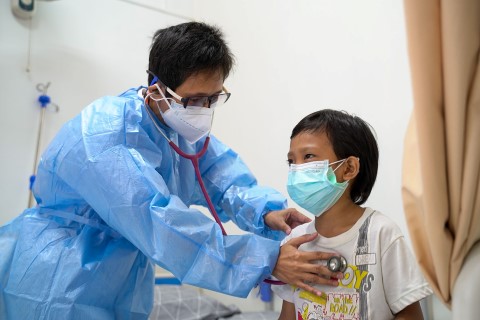KANSAS CITY, Mo. (January 6, 2023) – Children International partnered with Microsoft’s Tech for Social Impact team and skilled volunteers from across the company to participate in the annual “Hack for Good,” a program designed to leverage Microsoft’s expertise for nonprofits. This pro-bono program enables Microsoft employees to dedicate one week or more to creating bespoke digital tools and solutions for nonprofits. This support is often critical in determining whether a nonprofit chooses to adopt new technology or optimize existing systems due to limited resources.
The shared goal of this Hack for Good project was to digitize Children International’s “Community Scorecard.” The Community Scorecard — first implemented in Children International’s Dominican Republic and Guatemala local offices in 2018 — is an instrument used to report, track and measure data from the organization’s health care programs.
The Scorecard methodology is an inclusive community-driven approach to strengthen health care systems. Children International partners with local health care providers to provide health services to underserved communities.
 Children International community health care services in Manila, Philippines.
Children International community health care services in Manila, Philippines.
The current Scorecard primarily measures quality of care, availability of medical staff, availability of medicines and supplies, and community involvement and participation. The digitized version will capture the same data but include even more information while eliminating human error for inputting data into the nondigitized version.
The digitized version of the Scorecard will be able to create visualizations and illustrate global trends. After a brief training session, community members (e.g., cross-sector partners and local governments, health care providers, Children International field staff and peer organizations) will be able to input data from individuals receiving health care in the service area. The data then can be reviewed in real-time from different global locations, enabling key stakeholders to access the information while strengthening data-driven decision making, transparency and accountability. The data will be more reliable, clearer and easily digestible.
As Michael Tjalve, Director of Innovation, Tech for Social Impact at Microsoft further explains, “We co-designed a solution that collects data about the key Community Scorecard indicators locally at the clinics without needing a cellphone connection.
 Pictured is a mock-up of the dashboard.
Pictured is a mock-up of the dashboard.
“Based on a data model, the solution ensures consistent capture and use of data as it flows through the system and into the reporting component where a data visualization dashboard empowers staff to quickly get actionable insights about progress at individual clinics within a region and across regions, highlighting trends and outliers in the data.
“We’re looking forward to seeing this solution deployed for data-driven decision-making in a way that scales globally while improving lives and communities locally.”
Nine countries (Colombia, the Dominican Republic, Ecuador, Guatemala, Honduras, India, Mexico, the Philippines and Zambia) have implemented the original Community Scorecard with Children International. In 2021 alone, 18 clinics within these countries participated in the Social Accountability program and reached 242,192 people. With the support of the new digital tool, Children International will grow this program significantly, making it available to more communities.
Children International, based in Kansas City, Missouri, USA, is a global nonprofit that delivers child and youth development programming to break generational cycles of poverty. From childhood through young adulthood, Children International empowers young people in Colombia, Ecuador, the Dominican Republic, Honduras, India, Guatemala, Mexico, the Philippines, Zambia and the United States to forge a path out of poverty through access to health care, educational support, positive role models, and the life and job skills they need to become sustainably employed. When equipped to improve their own lives, young people also transform their families and communities, for generations to come. For more information, visit children.org.
Microsoft’s Tech for Social Impact team, part of Microsoft Philanthropies, is dedicated to empowering every nonprofit and international development organization to accelerate social impact. We bring together the best of Microsoft including cloud technology grants and discounts, Microsoft’s vast ecosystem of partners, and industry-specific solutions through Microsoft Cloud for Nonprofit. Learn more at www.microsoft.com/nonprofit.
Comments
You must be logged in to comment. If you have an account, click here to log in.